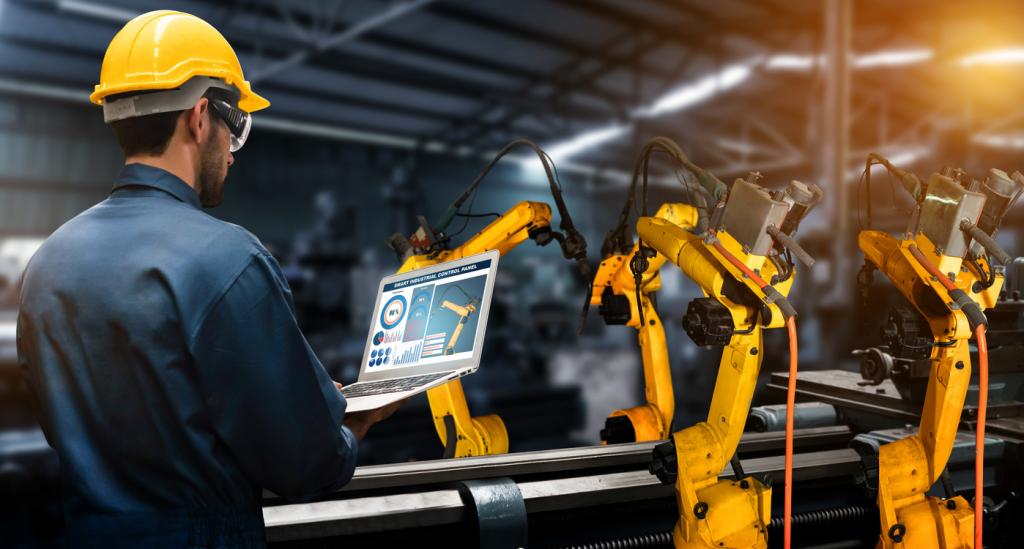Industry 4.0:The Era of Smart Manufacturing and Digital Transformation
 Industry 4.0, also known as the Fourth Industrial Revolution, represents the integration of advanced technologies and digitalization into the manufacturing sector. In this article, we explore the key features, benefits, and challenges of Industry 4.0, as well as its impact on manufacturing processes, supply chains, and the future of work.
Industry 4.0, also known as the Fourth Industrial Revolution, represents the integration of advanced technologies and digitalization into the manufacturing sector. In this article, we explore the key features, benefits, and challenges of Industry 4.0, as well as its impact on manufacturing processes, supply chains, and the future of work.
The Pillars of Industry 4.0
Industry 4.0 is built upon several transformative technologies that are reshaping manufacturing. These technologies include the Internet of Things (IoT), Artificial Intelligence (AI), Big Data Analytics, Cloud Computing, and Cyber-Physical Systems (CPS). The IoT connects machines, sensors, and devices to gather real-time data, enabling seamless communication and intelligent decision-making. AI and machine learning algorithms analyze vast amounts of data to extract insights, optimize processes, and automate tasks. Big Data Analytics leverages data to drive predictive maintenance, optimize production, and enhance quality control. Cloud Computing provides scalable storage and processing capabilities for handling massive amounts of data and facilitating collaboration. Cyber-Physical Systems integrate the physical and digital realms, combining sensors, actuators, and networked systems to enhance operational efficiency and flexibility.
Smart Manufacturing and Digital Twins
Industry 4.0 enables the transition to smart manufacturing, where connected machines and systems work collaboratively and autonomously. Digital Twins, virtual replicas of physical assets or processes, play a crucial role in smart manufacturing. By creating a digital twin, manufacturers can simulate, analyze, and optimize production processes, leading to improved efficiency, reduced downtime, and enhanced product quality. Real-time monitoring and predictive analytics enable proactive maintenance, minimizing unplanned downtime and optimizing resource allocation.
Agile Supply Chains and Customer-Centricity
Industry 4.0 promotes the development of agile and responsive supply chains. With real-time data, manufacturers gain better visibility into their supply networks, allowing for proactive demand forecasting, inventory management, and logistics optimization. Collaborative platforms and digital marketplaces facilitate seamless interactions between suppliers, manufacturers, and customers. This customer-centric approach enables personalization, customization, and on-demand manufacturing, meeting the evolving needs and preferences of consumers.
The Future of Work and Workforce Transformation
Industry 4.0 brings significant changes to the workforce. With increased automation and AI-driven systems, the nature of work is shifting towards more complex tasks requiring problem-solving, creativity, and critical thinking. Workforce transformation involves upskilling and reskilling employees to adapt to new technologies and job roles. Human-machine collaboration becomes essential, where humans focus on tasks that require emotional intelligence, strategic decision-making, and innovation, while machines handle repetitive and routine tasks.
Challenges and Considerations
Implementing Industry 4.0 poses several challenges. Cybersecurity becomes crucial as interconnected systems and data are exposed to potential threats. Addressing data privacy and ethical considerations is vital to building trust among consumers. The digital divide must be bridged, ensuring equitable access to technology and skills. Additionally, managing the transition and integrating legacy systems with new technologies requires careful planning, investments, and change management strategies.
Industry 4.0 represents a transformative era in manufacturing, driven by advanced technologies and digitalization. With the integration of IoT, AI, and data analytics, smart manufacturing, agile supply chains, and customer-centricity become achievable goals. Embracing the challenges and opportunities of Industry 4.0 will enable businesses to stay competitive and thrive in the evolving digital landscape.